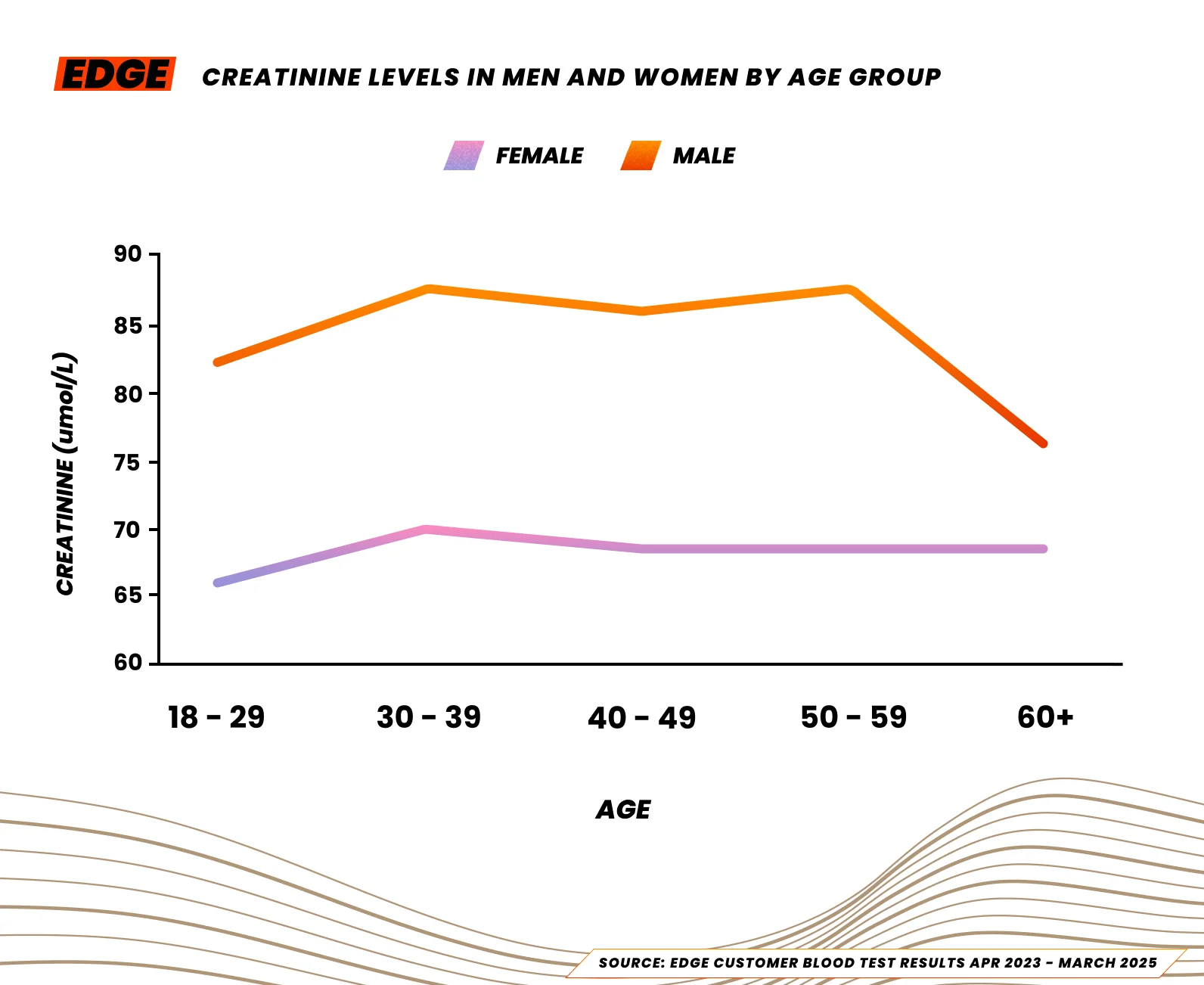What is Creatinine & why is it important for athletes?
1 min read
Published on
May 22, 2025
Written by
EDGE
Share this article
What Is Creatinine?
Creatinine is a waste product formed when creatine, a key compound in muscle energy metabolism, breaks down. It’s filtered by the kidneys and excreted in urine, making it a useful marker of kidney function.
For athletes, creatinine levels offer insight not just into kidney health but also hydration status, muscle mass, and recovery. However, interpreting creatinine in athletes requires context – particularly for those with high muscle mass, high protein diets or using creatine supplements.

"Creatinine is a key indicator of kidney function but also reflects muscle mass and protein metabolism – both highly relevant for athletes. Monitoring levels every 6–12 months can help track how your body is coping with protein intake, supplementation, and training intensity. Testing it alongside eGFR provides a clearer picture of kidney efficiency and overall metabolic health."
Creatinine and Athletic Performance
-
Muscle Mass & Training Load
Athletes naturally have higher creatinine levels due to increased muscle turnover. Resistance training, creatine supplementation, and high-protein diets can all raise levels without indicating a problem.
-
Hydration Status
Dehydration can cause a temporary spike in creatinine levels due to reduced kidney filtration. This can mimic signs of kidney stress but may simply reflect fluid loss.
-
Kidney Health
Sustained high levels may signal that the kidneys are under stress. This is particularly relevant for athletes engaging in ultra-endurance events, high-heat training, or taking performance supplements.
-
Recovery Indicator
In some cases, elevated creatinine alongside other markers (e.g. urea, CK) can suggest delayed recovery or excessive muscle breakdown.
What are normal creatinine levels for athletes?
We looked at blood test data from EDGE customers and found the median creatinine levels for men and women are 68 umol/L and 86 umol/L, respectively.
Here is a breakdown of creatinine levels by age and gender:
| Table 1: Creatinine Levels in Men and Women by Age Group (umol/L) | ||
| Age Group | Female | Male |
| 18-29 | 66 | 83 |
| 30-39 | 70 | 88 |
| 40-49 | 68.5 | 86 |
| 50-59 | 68.5 | 88 |
| 60+ | 68.5 | 77 |
Source: EDGE customer blood test results Apr 2023 – March 2025.
The labs we used to analyse blood samples state a healthy range for creatinine is generally between 45-84 umol/L for women and 59-104 umol/L for men.

Why Test Creatinine?
-
Establish a baseline – Helps differentiate between what's normal for you and what might signal a problem
-
Track recovery – Especially after intense competition or back-to-back training
-
Assess hydration status – Particularly useful in hot weather or during endurance blocks
-
Monitor kidney health – Especially if you're using NSAIDS, or high-protein diets long-term
Interpreting Results: What’s Normal for Athletes?
Creatinine levels are typically higher in athletes, so standard reference ranges may not apply. This is especially true for:
-
Strength and power athletes (e.g. weightlifters, sprinters)
-
Individuals using creatine monohydrate
-
Athletes on high-protein or keto diets
Isolated elevated creatinine isn't usually a concern unless accompanied by symptoms or other abnormal markers (like eGFR or urea). That’s why context is key.
Factors That Affect Creatinine Levels
-
Muscle Mass – More muscle equals more creatinine
-
Creatine Supplementation – Increases baseline levels slightly
-
Hydration – Dehydration raises concentration in blood
-
Training Intensity – Heavy sessions can temporarily increase creatinine
-
Diet – High meat intake boosts creatinine pre-test
How to Prepare for a Creatinine Test
-
Stay well-hydrated in the 24 hours before testing
-
Avoid strenuous exercise the day before
-
Note any supplements or medications taken
In Summary
-
Creatinine is a key marker of kidney function and hydration
-
Higher levels in athletes are common and not always a concern
-
Context matters — testing over time gives the clearest picture
-
Useful for endurance athletes, supplement users, and those training in extreme conditions
Check Your Creatinine Levels
Monitor your creatinine to protect long-term health, optimise recovery, and avoid misreading signs of overtraining or dehydration.
Get 10% off your first order
Want regular tips on how to make the most of your results? Join our newsletter and we'll give you 10% off your order!
Get the knowledge
Get expert advice to help you improve your results.
Go to our knowledge center


